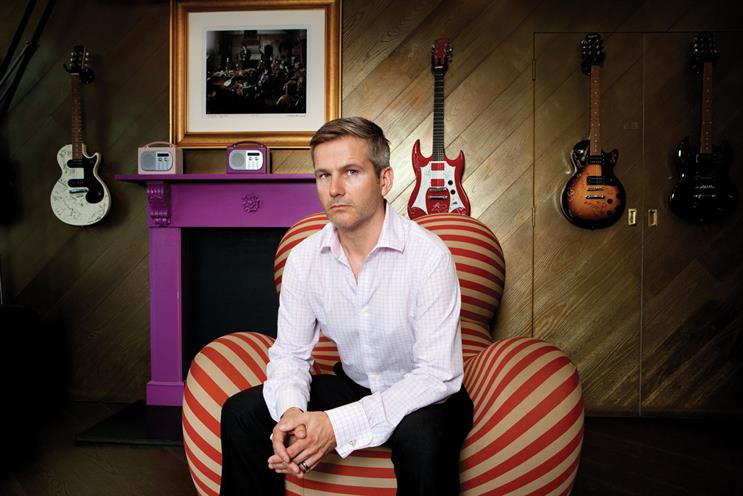
For many years, Absolute Radio has been the little guy, punching well above his weight. A challenger brand vying for advertising against the likes of Bauer and Global Radio, its revenues of £16 million last year represented just 6 per cent of commercial radio’s £550 million turnover.
Rumours of its potential sale continue to circulate, despite the station apparently near to breaking even for the first time since it was acquired by The Times Group for £53 million in May 2008. And the exit of the chief operating officer, Clive Dickens, at the start of 2013 was undoubtedly a blow to the relatively small but ambitious outfit.
Yet none of this dampens the enthusiasm of the station’s commercial director, Simon Kilby, who is unequivocal about his achievements since joining 18 months ago from Guardian News & Media.
Kilby, who describes himself as a typical Absolute listener – a reluctant adult who likes big rock bands – says: "The biggest success since I have been at Absolute is the development of our branded content – 2013 has been our best year for this; we achieved the biggest share of non-airtime revenue in the first half of the year, nearly 45 per cent against an industry average of about 20 per cent."
He reels off the programmes created for advertisers: Just For Men funded a Friday-night show discussing what it means to be a modern man; the Victoria and Albert Museum funded a documentary about David Bowie fronted by the comedian Tim Minchin to coincide with its exhibition on the singer; while the Financial Services Compensation Scheme paid for a programme about financial decision-making.
Such programming has helped rebuild Absolute from its nadir after rebranding from Virgin Radio in September 2008. It can now claim 3.3 million listeners if you include its portfolio of decade-specific digital brands, such as Absolute 80s.
Boosting revenues from digital and sponsorship – moving beyond standard ad sales – is crucial to Absolute’s success, Kilby says. He says that online ads hold the key to growing revenues in an increasingly connected world for the whole radio industry.
Absolute launched an online service 18 months ago, whereby users on connected devices provide basic data – name, age and gender, and permission to use their location – and log in each time they listen. They are targeted with ads relevant to this information and, in exchange, the breaks they hear contain only two ads, rather than the usual six on standard radio (the space is filled with a song or branded content). All this is enabled through AdsWizz’s ad platform, InStream.
It strikes me that radio is one of the few media without a big digital product to take to agencies
Kilby calls for the creation of a common platform that enables advertisers to target online listeners. He points out that talkSPORT also uses AdsWizz technology for online targeting, and says conversations are under way with other stations about an industry standard.
"It strikes me that radio is one of the few media without a big digital product to take to agencies – we believe InStream is a model for that," he says. "It gives our agencies greater targeting and allows us to be more accountable, which is obviously a big issue in the industry at the moment.
"We are able to charge a premium for the advertising because of the targeting. We think it works for everyone. What we’ve learned is that, to make it scalable and more interesting for the whole of the radio sector, we need more stations to come on board."
Across the industry, online accounts for about 10 per cent of total listening, so is there potential to lift revenues with a more concerted effort?
Howard Bareham, the head of radio at Mindshare, says: "InStream is a nice-to-have for advertisers, but what is the potential if you’ve got only two players [Absolute and talkSPORT] using it? Radio needs scale. You could get that if Bauer and Global joined up, but they will have their own agendas."
Meanwhile, it has recently been speculated that Bauer might be interested in buying Absolute and absorbing it into its Planet Rock franchise. For Kilby, however, such navel-gazing is pointless.
"We have recently won three more years of English Premier League commentary rights and signed up to another ten years of DAB carriage on Digital One," he says. "We’ll be announcing a sponsor for the football coverage next season and we’ve signed up Wickes for another year as headline sponsor of our breakfast show. We cannot let ourselves be dragged into speculation about what may or may not happen."
He highlights the researcher Work’s annual poll of planners, in which Absolute was named the most creative media owner in 2012 and 2013. By continuing to innovate, Kilby believes Absolute can help shape its own future as well as that of the industry.

